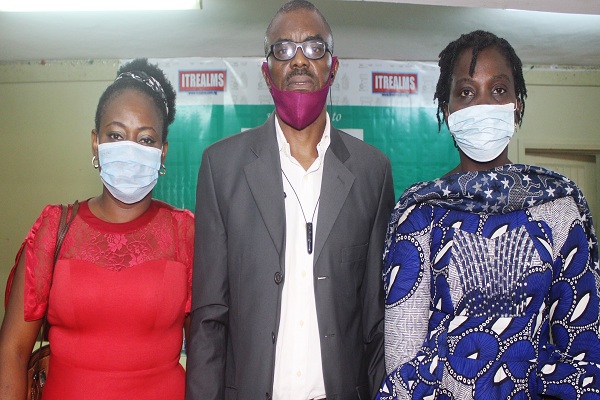News
NESREA, EPRON, NUJ Commend ITREALMS E-Waste Dialogue

Prof. Aliyu Jauro, director-general of the National Environmental Standards and Regulations Enforcement Agency (NESREA), and Mrs Ibukun Faluyi, executive secretary, E-Waste Producer Responsibility Organisation of Nigeria (EPRON), as well as the chairman, Lagos Council of Nigeria Union of Journalists (NUJ), Mr. Adeleye Ajayi, have commended ITREALMS E-Waste Dialogue.
They spoke at the 2020 ITREALMS E-Waste Dialogue held at the Welcome Center Hotels, Lagos with the theme: E-Waste in Nigeria: Challenges and Opportunities.
For the DG, NESREA who was ably represented by the Head of Port Operations in Lagos, Mrs. Ezinwayi Udechukwu, the event is timely as the number of e-waste in the country continues to soar.
The DG in a goodwill messages commended ITREALMS Media for the ITREALMS E-Waste Dialogue and looks forward to the outcome of deliberations to be made available to the agency for continuous engagement with enlarged stakeholders in the country.
The Executive Secretary, EPRON, Mrs. Faluyi on her own applauded ITREALMS Media for raising the tempo of discourse on electronic waste in the country with ITREALMS E-Waste Dialogue.
This effort, she described as novel, especially coming from a media organisation like ITREALMS Media and depicts concern of the media house for a better society in Nigeria in spite of growing number of electrical electronics waste, arising from increase in use of technologies.
She noted that Nigerians depended more on technologies during the recent nationwide lockdown over the ravaging COVID-19.
Faluyi believes that awareness creation can never be enough due to demands and usage of electrical and electronic devices cannot abate.
She canvassed for more synergy between media in carrying out its fundamental function of enlightening the public and social enterprise like EPRON.
Just as she thumbed-up for the management of ITREALMS Media and partners for this stride, when ordinarily, some organisation should have chickened out that the year is about to end, mostly with the effect of COVID-19.
The Lagos NUJ council chairman, Mr. Ajayi equally added his voice to the commendation, stating that the future is bright with this stride by ITREALMS to engage the Nigeria’s populace on the positive use and disposal of e-waste.
Earlier in his welcome address, Mr. Remmy Nweke, editor-in-chief of ITREALMS Media inc, disclosed that they were concerned with the rise in the country which are not properly disposed of eventually.
This situation, he said, was worsened by the random importation of electrical and electronic devices into the country without consideration for the end-life of such gadgets and attendant implication to the economy and social development.
Nweke also cited for instance the latest Global E-waste Monitor 2020; a collaboration of the Global E-waste Statistics Partnership (GESP) and International Telecommunication Union (ITU), which disclosed that some 53.6 million metric tonnes (Mt) of electronic waste was generated worldwide in 2019 alone.
He noted, this figure was up by 21 per cent within other statistics of the past five years and called for caution among developing countries and Nigeria specifically given the daily rise in number of subscriber-base which stood at 285,259,320 connected lines with some 198,961,361 active and 151,063,413 active internet data subscriptions across all the Nigerian Mobile Network Operators by technology, as at July 2020, even as new devices may become the other for the day as Nigeria will soon join countries with fifth generation (5G) deployment.
He said that ITREALMS E-Waste Dialogue aligns with the commemoration of the International E-waste Day (IeWD) 2020.
Nweke recollect that ITREALMS e-Waste Dialogue was initially scheduled for October 14 but due to COVID-19 lockdown and #EndSARS protest nationwide, it had to be rescheduled to this day, Thursday, December 17, 2020 as part of the Nigeria Internet Waste Dialogue.
ITREALMS E-Waste Dialogue was supported by the Nigerian Communications Commission (NCC), Association of Licensed Telecom Operations of Nigeria (ALTON) and Internet Exchange Point of Nigeria (IXPN) among others.
News
AfDB Supports Francophone Africa Start-ups with €6.5M

The African Development Bank Group last week approved an investment of €6.5 million in the Saviu II fund in order to support technology start-ups through their seed phase and first institutional fundraising, mainly in French-speaking Central and West Africa.

The Bank will invest €4.5 million as equity and €2 million as a first-loss hedging tranche on behalf of the European Commission, under the Boost Africa Programme.
This participation of the Bank Group will enable the Saviu II fund to give priority to companies with a strong technological or digital component.
Saviu II, the second investment vehicle of Saviu Partners, plans to invest between €500,000 and €3 million in about 20 technology or technology-oriented business-to-business start-ups in the seed phase or carrying out first institutional fundraising.
The Saviu II venture capital fund aims to make at least 60% of its commitments in the French-speaking countries of West and Central Africa: Côte d ‘Ivoire, Cameroon, Benin, Senegal, Togo, Burkina Faso and Mali.
The fund can also co-invest in promising technology companies in East Africa that have a strong team and business model, and whose strategy includes entering the market in French-speaking West African countries and establishing a strong presence there.
In addition, the fund will devote a dedicated envelope to pre-seed investments, focusing on minority equity investments, usually in co-investment with studios, incubators or other ecosystem partners.
News
Nigeria Inks $1.3bn MoU with AFC for Alumina Refinery, Mining Push

Nigerian Government has signed a $1.3 billion Memorandum of Understanding (MoU) with Africa Finance Corporation (AFC) via the Solid Minerals Development Fund (SMDF) to fund an alumina refinery, national geoscience mapping, and a strategic investment vehicle for mining growth.

Special Assistant to the Minister of Solid Minerals Development, Segun Tomori, said the refinery will process one million tonnes of bauxite yearly using a modern Bayer process, powered by an on-site gas-fired cogeneration plant.
Minister Dele Alake called it a transformative milestone boosting GDP, aligning with reforms that improve investment climate, regulations, and licensing to attract private capital. He directed agencies to fast-track permits.
The 20-year project at 95% utilization eyes 19 million tonnes total output, $1.2 billion annual GDP addition, $25 billion economic impact, and $8 billion forex earnings, per feasibility studies.
SMDF Executive Secretary Fatima Shinkafi termed it the agency’s biggest funding deal, supporting value-addition policy.
The partnership extends to geoscience mapping for mineral data, de-risking exploration, and a joint vehicle for mining assets.
Permanent Secretary Engr. Farouk Yabo praised the reforms. Shinkafi signed for government; AFC’s Franklin Edochie for the corporation, witnessed by AFC CEO Samaila Zubairu.
Tomori positioned it as Nigeria’s largest private mining investment and FDI magnet.
News
TeamApt, Awabah Partner to Boost Pension Drive for Nigerians

TeamApt Ltd., a subsidiary of Moniepoint Inc. and a leading financial infrastructure provider, has partnered with Awabah, the National Pension Commission’s first licensed Accredited Pension Agent, to expand pension access for millions of Nigerians in the informal economy.

The partnership was unveiled in Abuja at the launch of Awabah’s agent licence, themed “Building Financial Resilience: Securing the Future with Personal Pensions.”
At the event, PenCom Director-General Omolola Oloworaran underscored a major imbalance in Nigeria’s pension system, noting that while pension assets have grown to over ₦27 trillion, the benefits remain largely concentrated among formal-sector workers. She observed that most informal-sector workers—who make up the majority of Nigeria’s workforce—still retire without any form of savings.
This challenge is further highlighted in Moniepoint’s 2025 Informal Economy Report, which reveals that although 65 per cent of informal businesses recorded revenue growth, most lack the structural resilience required for long-term sustainability and succession.
Through the partnership, TeamApt—a Central Bank of Nigeria–licensed switching and processing company—will enable seamless pension registration and contributions for Awabah users via its Direct Debit service on Point of Sale (POS) terminals nationwide. Informal workers can enrol for personal pensions, tokenize their cards, and automate periodic contributions in just a few steps.
The initiative simplifies pension savings by turning what was once a complex, bureaucratic process into a routine transaction, enabling business owners and workers to build financial security beyond their productive years.
“When we started Awabah, we were driven by one core belief—that no African worker should be one accident or crisis away from poverty,” said Tunji Andrews, Chief Executive Officer of Awabah.
“This partnership with TeamApt allows us to scale that vision. By leveraging their Direct Debit service and extensive POS network, we are meeting informal workers where they already operate—markets, workshops, kiosks, and roadside businesses. With small, regular contributions, workers can now access personal pensions bundled with health, accident, and life insurance,” he added.
TeamApt CEO Dennis Ajalie said the collaboration aligns with the company’s long-standing mission to power Nigeria’s informal economy.
“At TeamApt and Moniepoint Inc., our focus has always been on enabling the informal sector,” Ajalie said. “Today, working within our licence framework and alongside our co-subsidiary, Moniepoint Microfinance Bank, we operate across all 774 local government areas, serving millions of Nigerians who drive economic activity.”
He described the partnership as a critical step toward pension inclusion, adding that it demonstrates how financial infrastructure can deliver real, long-term value to everyday Nigerians.
Ajalie also praised PenCom’s leadership for creating an enabling environment for innovation, noting that Oloworaran’s reforms have opened the door for partnerships capable of delivering sustainable pension coverage for informal workers.
The initiative is powered by TeamApt’s robust financial technology ecosystem, which has supported banks, fintechs, and financial institutions for more than a decade. Its omni-channel Direct Debit service allows automated recurring collections—such as pension contributions, subscriptions, and repayments—directly from customers’ bank accounts with their consent.
Beyond pensions, the platform enables informal workers to automate investments in the capital market, access healthcare through HMOs, and secure insurance coverage for themselves and their families—extending financial security far beyond retirement.

 E-Financial2 days ago
E-Financial2 days agoIran-Israel-US Conflict and CBN’s FX Gains: A Stress Test for Nigeria’s Monetary Stability

 E-Financial2 days ago
E-Financial2 days agoMutual Benefits Assurance Reaffirms Full Regulatory Compliance, Enhanced Governance

 General News2 days ago
General News2 days agoJAMB Uncovers AI-Driven Fraud Targeting UTME Candidates, Warns Parents

 General News2 days ago
General News2 days agoSERAP Asks FCCPC to Investigate Google, Meta, Others over Alleged Rights Abuses

 News2 days ago
News2 days agoTeamApt, Awabah Partner to Boost Pension Drive for Nigerians

 News2 days ago
News2 days agoFlashChange CEO, Bidemi Oke, Urges Startups to Build Strong Governance Structures Early

 E-Financial2 days ago
E-Financial2 days agoReps Mull Commission to Regulate Fintech Operations

 General News2 days ago
General News2 days agoCapelli Institute Commits to Advancing Trichology in Nigeria



























